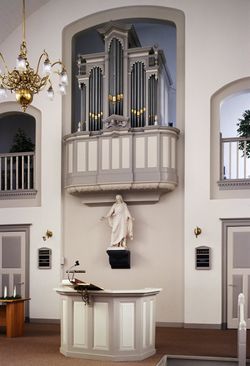Doopsgezinde Gemeente Beverwijk (Beverwijk, Noord-Holland, Netherlands)
 Interior, Doopsgezinde Kerk, Beverwijk. Photo by Paul van Galen and Kris Roderburg, Rijksdienst voor het Cultureel Erfgoed. Source: Wikimedia Commons. |
Beverwijk is a Mennonite congregation in the Dutch province of North Holland, in the beautiful flower bulb district between Haarlem and Alkmaar.
The origin of this congregation can no longer be traced, but already in the earliest times, shortly after 1530, there were traces of Anabaptism here. In June 1535 four Anabaptists of Beverwijk were imprisoned, two of whom died at the stake on 4 July 1535 (Claes Claesz and Cornelis Gijsbertsz), Cornelis Claesz of Beverwijk was executed in 1537 at Alkmaar, and the martyr Augustijn, executed about 1556, was also from this town. There must soon have been a Waterlander congregation here. The oldest list of members, now in the church archives, dates back to the second half of the 17th century, and begins with the statement that the previous one was lost. In 1668 the congregation bought a house and remodeled it as a church. Although the congregation was small, it contributed 700 guilders in 1727 and 199 guilders in 1736 to the Fonds voor Buitenlandsche Nooden (Fund for Foreign Needs), and had a salaried minister as early as the first half of the 18th century; one of these was the former Reformed preacher Anthonius van der Os, who was called in 1758 and paid a salary of 200 guilders, after he had been baptized upon the confession of his faith by the Zaandam Mennonite pastor Cornelis Loosjes Adr.-zn. When van der Os moved to Zaandam-Oost in 1874, ministers of other Mennonite congregations were asked to administer communion, and for other services the members rented pews in the Reformed church. The list of members of this period revealed that several of the members were baptized by immersion in Rijnsburg. The membership, 64 in 1710, had dropped to 4 by 1822.
In the beginning of the 19th century the congregational life became more and more settled. The communion and baptismal services as well as instruction of the youth were given over to the pastor of neighboring Krommenie 1823-1865; from 1865 to 1873 the pastor of Westzaan performed this service. Preachers of other congregations were regularly invited in to conduct regular services.
In 1873 the congregation decided to appoint a pastor and called J. Sepp of Witmarsum, and after his death in 1905 J. D. van Calcar 1906-1939, and A. Vis after 1939.
After the mid-19th century the membership increased markedly. In 1836 it was 12, in 1898, 114, in 1927, 384, in 1950, 486, and this in spite of the withdrawal of many members who lived in IJmuiden to organize a congregation of their own in 1909. The old church was replaced by a larger one in 1912, which had—contrary to the general Mennonite custom in Holland—over its pulpit a statue of Christ, a copy of the noted statue by the Danish sculptor Thorwaldsen. The cost of the building was defrayed by voluntary contributions of the members.
With few exceptions the members belonged to the modernistic wing. In 1914 a woman was for the first time chosen to the church directorate. Sunday school was held in conjunction with the Reformed and Lutheran churches. Communion services were held annually on Good Friday. The income derived from the real estate owned by the congregation enabled the congregation to provide for its own needs. In the early 1950s it had an active youth organization (from 18 to 30 years), a missionary society, choir, women’s organization, and Sunday school.
Bibliography
Hege, Christian and Christian Neff. Mennonitisches Lexikon, 4 vols. Frankfurt & Weierhof: Hege; Karlsruhe: Schneider, 1913-1967: v. I, 214.
Hoop Scheffer, Jacob Gijsbert de. Inventaris der Archiefstukken berustende bij de Vereenigde Doopsgezinde Gemeente to Amsterdam, 2 vols. Amsterdam: Uitgegeven en ten geschenke aangeboden door den Kerkeraad dier Gemeente, 1883-1884: v. I, 131, 133, 165, 184, 708, 1128; II, 1544, 1787 f., 1875.
Doopsgezinde Bijdragen (1864): 172; (1880): 165; (1909): 20.
Additional Information
Address: Meerstraat 62, 1941 JD Beverwijk, Netherlands
Phone: 0251-225508
Website: Doopsgezinde Gemeente Beverwijk
Denominational affiliation:
Algemene Doopsgezinde Societeit
Maps
Map:Beverwijk Gemeente (Beverwijk, Netherlands)
| Author(s) | J. D. van Calcar |
|---|---|
| Nanne van der Zijpp | |
| Date Published | 1953 |
Cite This Article
MLA style
Calcar, J. D. van and Nanne van der Zijpp. "Doopsgezinde Gemeente Beverwijk (Beverwijk, Noord-Holland, Netherlands)." Global Anabaptist Mennonite Encyclopedia Online. 1953. Web. 12 Feb 2026. https://gameo.org/index.php?title=Doopsgezinde_Gemeente_Beverwijk_(Beverwijk,_Noord-Holland,_Netherlands)&oldid=125242.
APA style
Calcar, J. D. van and Nanne van der Zijpp. (1953). Doopsgezinde Gemeente Beverwijk (Beverwijk, Noord-Holland, Netherlands). Global Anabaptist Mennonite Encyclopedia Online. Retrieved 12 February 2026, from https://gameo.org/index.php?title=Doopsgezinde_Gemeente_Beverwijk_(Beverwijk,_Noord-Holland,_Netherlands)&oldid=125242.
Adapted by permission of Herald Press, Harrisonburg, Virginia, from Mennonite Encyclopedia, Vol. 1, p. 320. All rights reserved.
©1996-2026 by the Global Anabaptist Mennonite Encyclopedia Online. All rights reserved.

